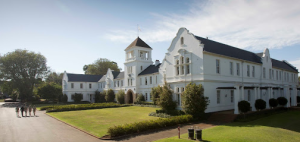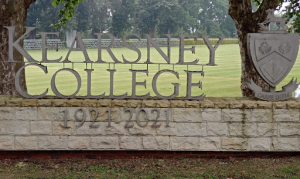The Essentials
Type of Institution: University
Fees per Semester: R6 000 – R35 000
Address: PO Box 94, Makhanda 6140, Eastern Cape, South Africa
Phone Number: +27 46 603 8111
Chancellor: Lex Mpati
Vice Chancellor: Sizwe Mabizela
Number of students: 10 000+
Website: https://www.ru.ac.za/
Email: Communications@ru.ac.za
Table Of Contents
- Overview
- Contact Details
- Address
- Location
- School Fees
- Courses & Programs
- Vacancies and Entry Requirements
- Logo
- Notable Alumni
- Pros and Cons
- Author’s Review
Overview
Rhodes University is a public research university located in Grahamstown, Eastern Cape, South Africa. Founded in 1904, it is one of the oldest and most prestigious universities in South Africa, known for its strong academic reputation and small student body, which allows for close student-faculty interaction.
Academics
Rhodes University is renowned for its high academic standards, with strong faculties in Humanities, Sciences, Commerce, Law, Pharmacy, and Education. The university offers a variety of undergraduate and postgraduate programs. Its journalism and media studies department is particularly well-respected across Africa.
Research
Rhodes has a strong focus on research, with several institutes and research centers, especially in the areas of environmental science, pharmacy, biotechnology, and social sciences. The university is involved in international research collaborations and has a significant output of peer-reviewed research publications.
Campus and Facilities
The campus is compact and features a mix of historic and modern buildings. It also offers well-equipped libraries, research laboratories, and sporting facilities. Student life is vibrant, with a strong tradition of residence hall living and an emphasis on extracurricular activities, including student-run organizations and societies.
Location
Situated in Grahamstown (Makhanda), the university enjoys a quiet, small-town atmosphere conducive to academic focus, but it also hosts the famous National Arts Festival, making it a hub of cultural activity.
Student Support
Rhodes provides robust student support services, including academic counseling, health services, and career development programs.
International Reputation
Despite its small size, Rhodes has a significant international presence, attracting students and faculty from around the world. Its alumni network is influential, particularly in journalism, business, and academia.
Admission
Entry requirements vary depending on the faculty and program, with competitive standards for both undergraduate and postgraduate applicants.
Notable Alumni
Rhodes University has produced many distinguished graduates, including political leaders, renowned journalists, and academics.
Rhodes University Contact Details
You can contact Rhodes University via their landline, email or you can visit their website for further contact details.
Phone Number: +27 46 603 8111
Website: https://www.ru.ac.za/
Email: Communications@ru.ac.za
Rhodes University Address
PO Box 94, Makhanda 6140, Eastern Cape, South Africa
Rhodes University Location
Rhodes University’s main campus is located in the town of Makhanda (Grahamstown) under the Eastern Cape Province of South Africa.
Rhodes University Fees
Rhodes University’s fees is currently standing at R6 000 – R35 000 per semester depending on the program you are studying and the level of degree you are studying. Please contact the institution or visit them to get the latest fees structure as it can change at any term or semester.
Rhodes University Courses & Programs
Rhodes University offers a wide range of undergraduate and postgraduate courses across various faculties.
Faculty of Humanities
Undergraduate Programs:
Bachelor of Arts (BA)
Bachelor of Fine Arts (BFA)
Bachelor of Journalism and Media Studies (BJMS)
Bachelor of Social Science (BSocSc)
Postgraduate Programs:
Honours, Master’s, and PhD in various disciplines like:
Anthropology
Drama
English Language and Linguistics
History
Journalism and Media Studies
Philosophy
Political & International Studies
Psychology
Sociology
Music
Faculty of Commerce
Undergraduate Programs:
Bachelor of Business Science (BBusSc)
Bachelor of Commerce (BCom)
Postgraduate Programs:
Honours, Master’s, and PhD in:
Accounting
Economics
Information Systems
Management
Financial Management
Marketing
Organizational Psychology
Faculty of Science
Undergraduate Programs:
Bachelor of Science (BSc)
Bachelor of Science (Information Systems) (BSc)
Bachelor of Science in Biotechnology
Postgraduate Programs:
Honours, Master’s, and PhD in:
Biochemistry
Botany
Chemistry
Computer Science
Environmental Science
Geology
Human Kinetics and Ergonomics
Mathematics
Microbiology
Physics
Zoology
Faculty of Law
Undergraduate Programs:
Bachelor of Laws (LLB)
Joint LLB (combined with a BA or BSocSc)
Postgraduate Programs:
Master of Laws (LLM)
Doctor of Laws (LLD)
Postgraduate Diplomas in specialized areas like Labour Law
Faculty of Pharmacy
Undergraduate Programs:
Bachelor of Pharmacy (BPharm)
Postgraduate Programs:
Master of Science in Pharmacy (MSc)
Master of Pharmacy (MPharm)
Doctor of Pharmacy (PhD)
Postgraduate Diplomas in Clinical Pharmacology and Industrial Pharmacy
Faculty of Education
Undergraduate Programs:
Bachelor of Education (BEd) – Foundation Phase
Postgraduate Programs:
Postgraduate Certificate in Education (PGCE)
Honours, Master’s, and PhD in:
Education (specializations in Curriculum Studies, Education Leadership, Environmental Education, etc.)
Higher Education Studies
Mathematics Education
Faculty of Pharmacy
Bachelor of Pharmacy (BPharm)
Postgraduate Diploma in Pharmaceutical Sciences
Master’s and Doctoral Programs in Pharmacy-related fields
Additional Programs:
Extended Studies Program: For students who do not meet the regular admission requirements, Rhodes offers extended degree programs in Science, Commerce, and Humanities.
Short Courses: In areas such as Leadership, Environmental Education, and Professional Development.
Rhodes University Vacancies and Entry Requirements
Vacancies
Vacancies at Rhodes University vary depending on the time of year and the needs of different faculties and departments. For the latest vacancies, you can visit the Rhodes University Vacancies Portal on their official website.
Entry Requirements
Rhodes University has specific entry requirements for undergraduate and postgraduate programs.
Undergraduate Entry Requirements
Admission to Rhodes University undergraduate programs is based on the completion of the National Senior Certificate (NSC) or an equivalent qualification with appropriate subject choices.
NSC Requirements:
A minimum of 4 subjects at Level 4 or higher (50% or above).
English must be passed at Level 4 or above.
Mathematics or Mathematical Literacy, depending on the program.
Life Orientation at Level 4.
For certain faculties (e.g., Commerce or Science), specific subject requirements like Mathematics or Physical Science at Level 5 or higher may apply.
Faculty-specific Requirements:
Humanities: English language proficiency and a general minimum pass of 50% across all subjects.
Commerce: Mathematics at Level 4 or higher.
Science: Mathematics and Physical Science at Level 5 or higher.
Law: High academic achievement, including good performance in languages.
Pharmacy: High scores in Mathematics and Physical Science (typically at Level 6 or higher).
Alternative Admission Options:
For students not meeting the regular entry criteria, there is an Extended Studies Program which provides academic support and a pathway into full degree programs.
Postgraduate Entry Requirements
For admission to postgraduate programs, students must typically hold a relevant undergraduate degree. Specific requirements vary by program:
Honours Programs:
A Bachelor’s degree with a minimum average of 65% in the major subject.
Master’s Programs:
A Bachelor’s degree or an Honours degree with a good academic record (usually a minimum of 65%).
Some programs may require relevant work or research experience.
PhD Programs:
A Master’s degree in a relevant field.
Research proposal submission and approval by the relevant department.
International Students
International students must have equivalent qualifications from their home country that match the South African NSC requirements.
Proof of English language proficiency (such as TOEFL or IELTS) may be required if the previous education was not in English.
Application Process
Online Application: Students can apply online through the Rhodes University website. Both undergraduate and postgraduate applications have deadlines, typically in September for the following academic year.
Supporting Documents:
Certified copies of academic transcripts.
Identity document or passport.
A personal statement or motivation letter (for some postgraduate programs).
References or letters of recommendation for postgraduate studies.
For more detailed information, it is advisable to check the specific entry requirements for each program directly on the Rhodes University website or contact the admissions office.
Rhodes University Logo
Below is the logo of Rhodes University with excellent quality and it is available to download in PNG (transparent file) JPEG and PDF.
Rhodes University Logo
Rhodes University Notable Alumni
Embeth Davidtz – American-South African actress.
Ian Douglas Smith – Former Prime Minister of Rhodesia
Chris Hani – leader of the South African Communist Party and chief of staff of uMkhonto we Sizwe, the armed wing of the African National Congress (ANC)
Mandla Mandela – tribal chief of the Mvezo Traditional Council and the grandson of Nelson Mandela
Stella Ndabeni – Abrahams – Minister of Small Business Development
Mcebisi Jonas – former Deputy Finance Minister of the Government of South Africa
Rob Davies – minister of trade and industry of South Africa from 2009 to 2019.
Rhodes University Pros and Cons
Pros
Reputation for Academic Excellence: Rhodes University is renowned for its academic rigor and high standards, consistently ranked among the top universities in South Africa.
Strong Research Focus: The university has a strong emphasis on research, particularly in the humanities and social sciences, with numerous research centers and initiatives.
Small Class Sizes: Rhodes is known for its small class sizes, which foster a more personalized and interactive learning environment.
Beautiful Campus: The campus is located in Grahamstown and is noted for its picturesque setting and historic architecture, providing a serene and conducive study environment.
Community and Campus Life: Rhodes University offers a vibrant campus life with active student societies, clubs, and sports, contributing to a well-rounded university experience.
Supportive Learning Environment: The university provides academic support services, including tutoring, counseling, and career guidance, to help students succeed.
Inclusive and Diverse Atmosphere: Rhodes is known for its commitment to inclusivity and diversity, with programs and initiatives aimed at creating a welcoming environment for all students.
Strong Alumni Network: The university boasts a network of successful alumni who contribute to the university’s prestige and can offer valuable connections and mentorship.
Cultural and Historical Significance: Located in a region rich in cultural and historical significance, the university offers students a unique opportunity to engage with local heritage and community.
Cons
Location and Accessibility: Grahamstown is a relatively small town, and its remote location may not offer the same level of urban amenities and opportunities as larger cities.
Limited Program Diversity: While strong in certain fields, Rhodes University has a more limited range of programs compared to larger universities with broader faculties.
Accommodation Challenges: There can be limited on-campus accommodation, and students may need to find housing in town, which can be a challenge and may affect students’ daily commute.
Funding and Financial Aid: Although Rhodes offers some financial aid and scholarships, securing sufficient funding can be competitive and may not always meet all students’ needs.
Job Market and Career Opportunities: The university’s location in a smaller town may present fewer job market opportunities and internships compared to institutions situated in larger urban centers.
Infrastructure and Facilities: Some students have reported that certain facilities and infrastructure, while charming, may not always be as modern or extensive as those at larger institutions.
Administrative and Bureaucratic Hurdles: Like many institutions, Rhodes may experience administrative delays or bureaucratic challenges, which can sometimes frustrate students.
Cultural Adjustment: For students coming from other regions or countries, adjusting to the small-town culture and pace of life in Grahamstown may take time.
Author's Review
Rhodes University stands out as a prestigious institution with a strong reputation for academic excellence, particularly in the humanities and social sciences. Its commitment to a personalized education, supported by small class sizes and a picturesque campus, creates an enriching environment conducive to both academic and personal growth.
The university’s vibrant campus life, inclusive atmosphere, and robust support systems further enhance the student experience, making it a compelling choice for those seeking a close-knit academic community.
However, potential students should weigh the challenges of Rhodes University’s remote location, limited program diversity, and accommodation constraints.
While Grahamstown offers a unique and tranquil setting, it may not provide the same range of urban amenities or career opportunities as larger cities. Additionally, securing adequate financial support and navigating administrative processes can be challenging.
Overall, Rhodes University provides a distinctive educational experience that is well-suited to students who value a supportive, research-focused environment and are prepared to embrace the charm and challenges of a smaller town.
For those who thrive in an intimate academic setting and are drawn to the university’s strong academic and community values, Rhodes offers a rewarding and memorable university journey.



